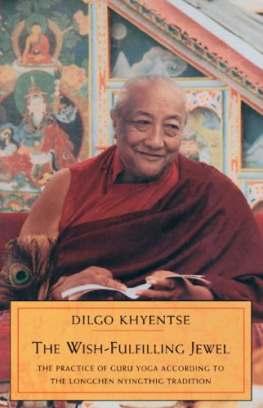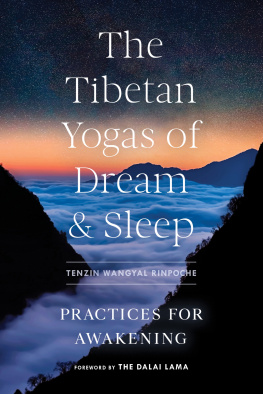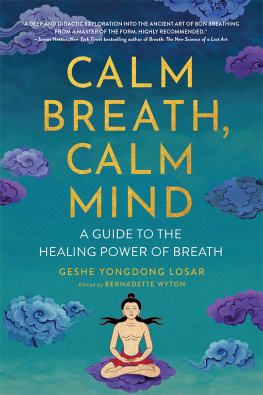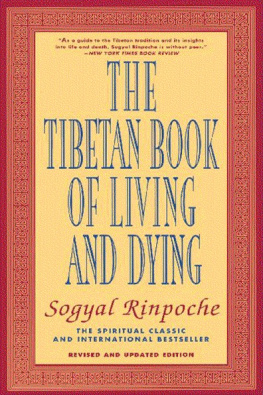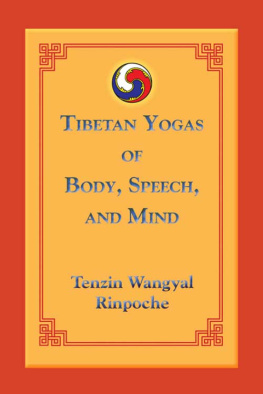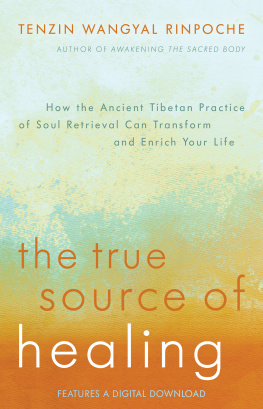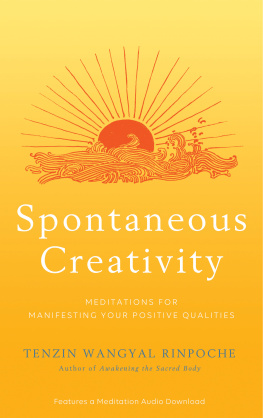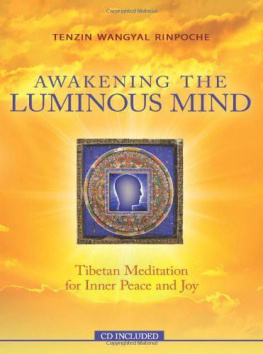To access the audio files that accompany this book, visit SoundsTrue.com/TibetanSoundHealing and choose to either download the tracks to your computer or stream them on your reading device.
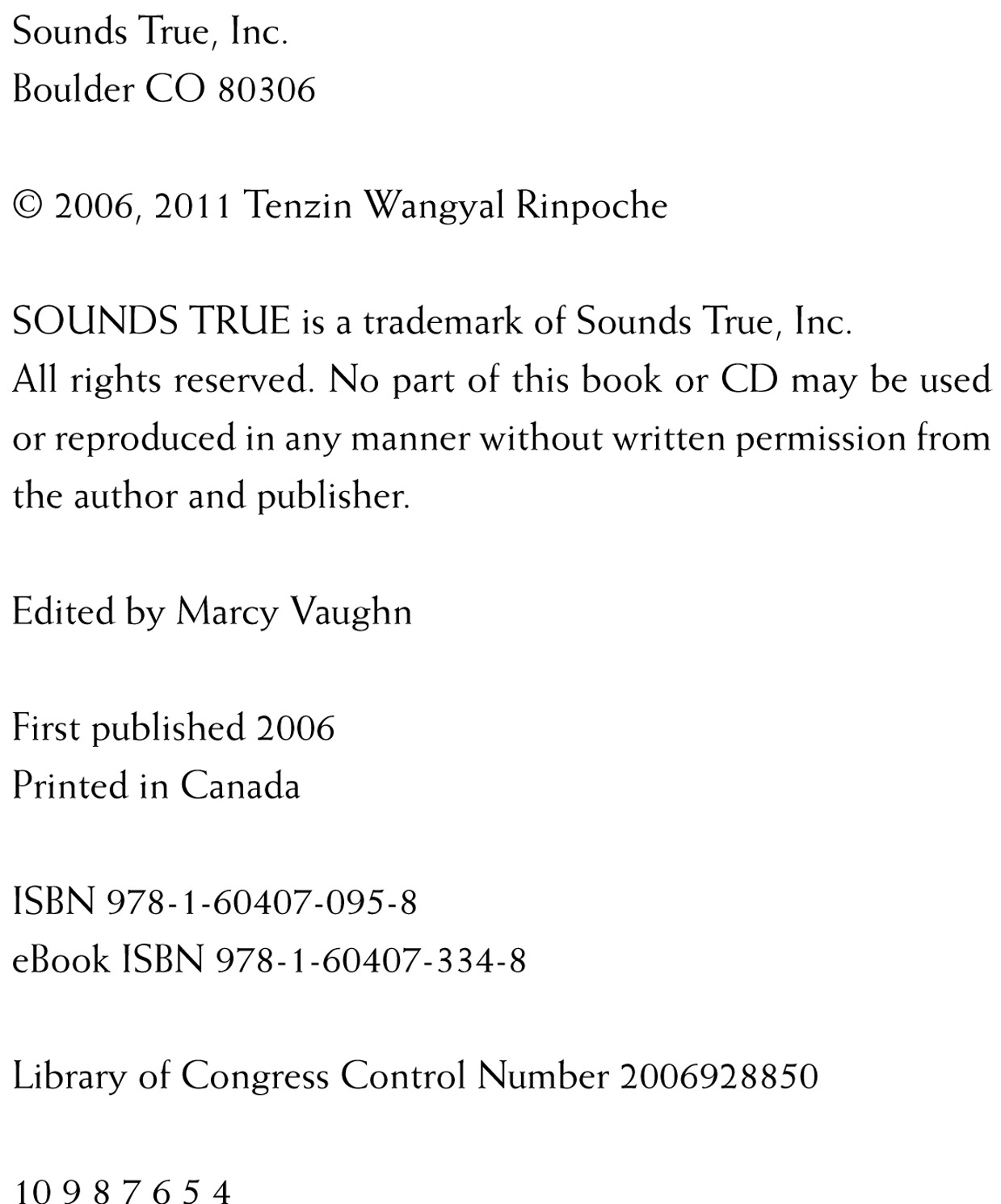
Copyright
Preface
I was born in India to a very traditional Tibetan family. My mother and father both had fled Tibet with only the clothing on their backs. At a young age, I entered the monastery, where I received intensive training in the, Bn Buddhist tradition. Bn is Tibets most ancient spiritual tradition. It includes teachings and practices applicable to all parts of life, including our relationship with the elemental qualities of nature; our ethical and moral behavior; the development of love, compassion, joy, and equanimity; and Bns highest teachings of dzogchen, or great completion. According to the traditional Bn account of its origins, many thousands of years before the birth of the Buddha Shakyamuni in India, the Buddha Tonpa Shenrab Miwoche came to this world and expounded his teachings. Followers of Bn receive oral teachings and transmissions from teachers in a lineage unbroken from ancient times until the present day.
My monastic training included an eleven-year course of traditional studies at the Bn Dialectic School, culminating in a geshe degree, which could be considered the equivalent of a doctorate in the philosophy of religion in the West. While at the monastery, I lived closely with my teachers. One of my root teachers, Lopon Sangye Tenzin, recognized me as a tulku, or reincarnation, of the famous meditation master Khyungtul Rinpoche.
The Bn Buddhist tradition is a tradition rich with methods to guide all beings on the path to liberation. I am able to make these precious teachings available in the West because of the tireless dedication of my teachers to preserve these teachings and because of their profound wisdom and loving kindness.
Through teaching Western students, I have learned much. Tibetans are not used to asking so many questions! Many Western students helped me by asking questions about the dharma, the teachings about the path to liberation from suffering. In the challenge of bringing the Tibetan Bn Buddhist dharma to the West, these were very valuable questions. I had experienced one way of teaching in the monastery; I have experienced another way of teaching in the West. I come to the place of offering this practice of the Five Warrior Syllables as a result of my work, my practice, my interaction with students, and my interaction with Western culture. My teaching style is a result of many years of familiarity and reflection.
Dharma is not nearly as successful in the West as it can be, and this makes me sad. I see people doing all kinds of crazy things with Buddhist ideas and philosophy. For some, Buddhism is so intellectually stimulating that they discuss it for years. In the end, what is the result? What has changed in the students conduct? Students repeat the same dharma discussions over and over with this teacher and then with a new teacher, with different students, and in different retreat situations. Afterward, many go back to exactly the same place where they began ten, fifteen, twenty years ago. The dharma has not deeply touched them or taken root in the proper way.
There is often a separation between the real issues that we live with in everyday life and the spiritual life to which we aspire. These two areas often dont communicate with each other at all. For example, in our spiritual practice we pray for the development of compassion by repeating, May all sentient beings be free from suffering and the cause of suffering. But how real is compassion in your life? How deeply has that aspiration entered your life? If you investigate how you are actually living, you may be disappointed because you do not really feel compassion when you consider your annoying neighbor or your recent reaction to your aging parents. Even if you chant again and again, May all sentient beings be free from suffering and the cause of suffering, someone who knows you very well could ask you, When you say all sentient beings, are you really including these five people, and especially that last one?
This practice of the Five Warrior Syllables is a practice that can change your life. But you have to bring your spiritual practice into the very conditions and struggles of the life you are actually experiencing. If you cannot make changes in the simple struggles of your day-to-day life, then there is no way to make changes in the big places where you aspire to be of benefit to all beings. If you are not able to love someone with whom you live or to be kind to your parents, friends, and colleagues, then you cannot love strangers, and you certainly cannot love those who make you feel bad. Where do you begin? You begin with your own face. When you want to see changes in your life, and you dont see those changes, listen to the clear instructions of this meditation practice and bring the practice directly into your life.
It is my sincere desire that this simple and elegant practice of the Five Warrior Syllables, which is based on the highest teachings of the Tibetan Bn Buddhist tradition of which I am a lineage holder, will benefit many beings in the West. Please receive it with my blessing, and bring it into your life. Let it support you to become kind and strong and clear and awake.
Tenzin Wangyal Rinpoche
Charlottesville, Virginia
March 2006
Introduction
The heart of the spiritual path is the longing to know and to be your true and authentic self. This has been the motivation of thousands who have gone before you and will come after you. According to the highest teachings in the Tibetan Bn Buddhist tradition, the true self that we long for is primordially pure. Each one of us, just as we are, is primordially pure. Of course when you hear that, you may think that it sounds like a great principle or philosophy, but you may not particularly feel that way right now. For your whole life, you have been flooded with images and messages that you are not pure, and it is easy for you to believe that you are not. Nevertheless, according to the teachings, your true nature is pure. That is who you really are.
Why is it so difficult to access or experience this purity? Why is there so much confusion and suffering? The truth of the matter is that our true self is too close to the mind that experiences suffering. It is so close we rarely recognize it, and so it is obscured. The good news is that the moment we begin to suffer or recognize that we are confused, we have an opportunity to awaken. Suffering shakes us and brings us the opportunity to awaken to a deeper truth. Most of the time when we suffer, we feel we need to change something in order to improve our lives. We change our jobs, relationships, diet, personal habits, and on and on. There are huge industries driven by this restless need that we experience to constantly improve our conditions and ourselves. While these actions may provide temporary relief or improve the quality of life, the methods never seem to go deep enough to cut the root of our dissatisfaction. This simply means that through all the methods of self-improvement we engage, as beneficial as they may seem, we have not fully met and become who we truly are.
Our dissatisfaction is useful when it makes us ask new questions, but it is most helpful when we ask the right question. According to the highest teaching in my tradition, the question we should be asking is, Who is suffering? Who is experiencing this problem? This a very important question to ask, but if it is not asked in the right way, it is possible to end up with the wrong conclusion. When we ask, Who is suffering? we have to look directly and clearly into the inner space of our being. Many do not look long enough or thoroughly enough to connect with their innermost essence.


